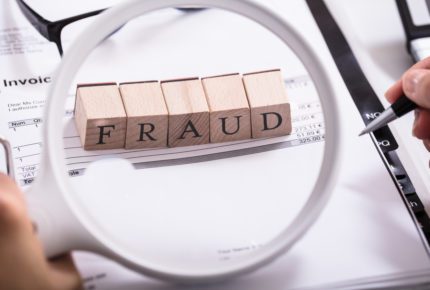

These days, there are more different types of online scam than you can count. From email scams, to dodgy online shopping, to SMS messages with fraudulent links within them, the Internet is rich with possibilities for fraud. Fraudsters have even been known to trick the same person twice in what is known as ‘recovery fraud’ where they pretend to help the victim recover losses from the original scam, whilst actually robbing them again. Some criminals have also masqueraded as the National Crime Agency (NCA) or HM Revenue and Customs (HMRC) under the pretence of investigating fraud in order to dupe victims into revealing their personal details.
The technology involved in online scamming offences can be quite complex and is developing quickly. Law enforcement in the UK has struggled to compete with the technological capabilities of online fraudsters, meaning that many online scams go unpunished. However, if you are convicted in relation to your involvement in an online scam, you could face a hefty jail sentence. Therefore, if you are arrested and charged in relation to an online scam, it is worth making sure that you understand the law and that you instruct a reputable criminal defence solicitor to represent you.
What is phishing?
Phishing is one type of online scam. It occurs where fraudsters send their victim an email or text message that convinces them to reveal their personal information. This could be passwords, a bank account number, or their National Insurance number. They then use this information to gain access to the victim’s email, bank, or other accounts, in order to impersonate them. Usually, the correspondence containing the phishing link will look as though it is from a company that the victim knows and trusts. Sometimes, the victim will be asked to click a link that will lead to the installation of malware or the freezing of the system as part of a ransomware attack. Phishing is also used to attack corporations or government organisations in order to gain access to their networks and/or their data.
Phishing is often a type of fraud, but it can be difficult to track down the perpetrators, especially where they are based overseas. Whilst the CPS has the power to prosecute individuals located in other countries for online offences committed against people based in the UK, in practice it can be difficult for them to do so.
What are examples of phishing?
The following are some examples of phishing:
- A fake email that warns an individual that their bank account is at risk and provides a link to change their password. The individual is then redirected to a bogus renewal page, which steals their personal information. This information is then used to access their bank accounts and transfer money out. This type of email is typically sent out to thousands of email addresses in the hope that a small minority of recipients are duped into responding.
- Where the hacker specifically targets one person, this is known as ‘spear phishing’. For example, a hacker contacts a departmental project manager posing as the marketing director and pretending to attach an invoice. Instead of the link actually being to a real invoice, it is linked to a spoofed invoice with a login When the project manager enters their details, the fraudster steals their credentials and therefore gains access to the organization’s network.
Which criminal offence is online scamming?
Online scamming is usually a type of fraud, but can also often involve money laundering offences. These are both serious offences. Often they will be investigated by the National Crime Agency (NCA), rather than by local police forces. The NCA’s remit is to fight serious and organised crime.
There are various different types of fraud set out in the Fraud Act 2006. Online scamming often falls under the category of fraud by false representation pursuant to Section 2 of the Fraud Act 2006. Fraud by false representation is committed where a person:
- dishonestly
- makes a false representation
- knowing or believing it to be false and misleading
- with the intention of making a gain for themselves or another, or to cause a loss to another, or to expose another to loss.
For example, a phishing scam that intends to obtain someone’s bank account details would be fraud by false representation. The false representation would be the email purporting to be from their bank. The fraudster would be acting dishonestly in sending the email, as they would be aware that they were not sending a legitimate email from the victim’s bank. They would also be aware that the email contains false and misleading information. The email would be intended to cause a loss to the victim, and a gain to the scammer.
Where the money obtained fraudulently is subsequently converted to make it look as though it comes from a reputable source, online scams may also include the criminal offence of money laundering. Money laundering is prohibited by Part 7 of the Proceeds of Crime Act 2002 (POCA). These days, money laundering often occurs through transferring illicitly obtained funds onto cryptocurrency platforms.
Alternatively, sometimes the bank accounts of individuals are used to clean the money, often without the individual involved even being aware. These individuals are known as ‘money mules’. If your account is used for unlawful purposes without your knowledge or consent, you would not usually be guilty of a crime. If this has happened to you and you have still been arrested or charged, you should seek the advice of a criminal defence solicitor.
Can you get into trouble for scamming a scammer?
Although it can be tempting to try to get your own back against a scammer, it is not generally a good idea. If you make a false representation in order to make a gain for yourself or a loss for another, then you will have committed the criminal offence of fraud. This is true even if your target is a criminal who previously de-frauded you. Whilst the scammer may be unlikely to report you to the police, they could be part of an organised crime network, and therefore by interacting further with them, you could put yourself in danger. If you have been a victim of fraud, instead of taking the law into your own hands, you should report the incident to the police.
What sentence could you face for online scamming?
Both money laundering and fraud are either way offences. This means that they can be heard in the Magistrates’ Court in less serious cases where the defendant does not elect for trial by jury. Where the magistrate considers that their sentencing powers are inadequate, or where there are complex issues at play that will require expert evidence, the case will be heard in the Crown Court. The case will also be heard in the Crown Court where the defendant elects for a trial by jury.
The Crown Court has greater sentencing powers than the Magistrates’ Court. In the Crown Court, you could face a maximum sentence of 14 years for money laundering, and 10 years for fraud. If the case is heard in the Magistrates’ Court the maximum sentence you would be able to receive for each offence is a 6-month custodial sentence. Combining your sentences together, the Magistrates Court can only sentence you to one year in prison maximum. Therefore many defendants consider remaining in the Magistrates’ Court to be the safer option.
However, statistically speaking, you are more likely to be acquitted in the Crown Court, as the jury are more likely to give you the benefit of the doubt in comparison to a District Judge in the Magistrates’ Court. Electing which court should hear your case is therefore a decision that requires some careful deliberation – if you are in this position, it is advisable to discuss your options with a criminal defence solicitor.
When assessing the sentence that you should face, the court will assess your culpability for the offence, and the harm that was caused. For financial crime, the harm that was caused is usually closely related to the sum of money involved in the offence. When looking at your culpability, the court will assess your role in the offence. If you were involved in planning a large-scale scam that impacted upon many people, your level of culpability will be taken to be higher than one-off or opportunistic offending. Your level of culpability will also be taken to be higher if you deliberately targeted vulnerable individuals such as elderly people, or if you pressured others to offend alongside you. The Sentencing Council’s guide on fraud provides more details in respect of the factors that the court will take into consideration when deciding your sentence.
Where to get further help?
If you have been accused of fraud, Stuart Miller Solicitors are the criminal defence firm for you. Our experienced team of solicitors have the technical know-how to understand complex online technologies. We will explain the law clearly to you and ensure that your rights are upheld in the criminal justice process. You could even get your case dropped before court. Contact us for a no-obligation consultation today.
OUR COMMITMENTS TO YOU:
-
Responsive
A legal expert will consult you within 24 hours of making an enquiry.
-
Empathetic
We will always treat you with trust, understanding and respect.
-
Specialised
Your case will be handled by an expert who specialises in your type of offence.
-
Proactive
We will take early action to end proceedings as soon as it is practically and legally possible to do so.
-
Engaged
You will be kept updated on your case at all times. We will provide a named contact available to answer your questions.
-
Caring
We understand this is a difficult and stressful time for you and your family. Our team will support you every step of the way.
-
Tenacious
We will never give up on your case. We fight tirelessly to get you the best possible outcome.